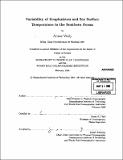Variability of zooplankton and sea surface temperature in the Southern Ocean
Author(s)
Verdy, Ariane
DownloadFull printable version (3.765Mb)
Other Contributors
Woods Hole Oceanographic Institution.
Advisor
Glenn R. Flierl.
Terms of use
Metadata
Show full item recordAbstract
Interactions between physical and biological processes in the Southern Ocean have significant impacts on local ecosystems as well as on global climate. In this thesis, I present evidence that the Southern Ocean circulation affects the variability of zooplankton and sea surface temperature, both of which are involved in air-sea exchanges of carbon dioxide. First, I examine the formation of spatial patterns in the distribution of Antarctic krill (Euphausia superba) resulting from social behavior. Turbulence of the flow is found to provide favorable conditions for the evolution social behavior in an idealized biological-physical model. Second, I analyze observations of sea surface temperature variability in the region of the Antarctic circumpolar current. Results suggest that propagating anomalies can be explained as a linear response to local atmospheric forcing by the Southern Annular Mode and remote forcing by El-Nifio southern oscillation, in the presence of advection by a mean flow.
Description
Thesis (S.M.)--Joint Program in Physical Oceanography (Massachusetts Institute of Technology, Dept. of Earth, Atmospheric, and Planetary Sciences; and the Woods Hole Oceanographic Institution), 2006. Includes bibliographical references (p. 69-74).
Date issued
2006Department
Joint Program in Physical Oceanography; Woods Hole Oceanographic Institution; Massachusetts Institute of Technology. Department of Earth, Atmospheric, and Planetary SciencesPublisher
Massachusetts Institute of Technology
Keywords
Joint Program in Physical Oceanography., Earth, Atmospheric, and Planetary Sciences., Woods Hole Oceanographic Institution.